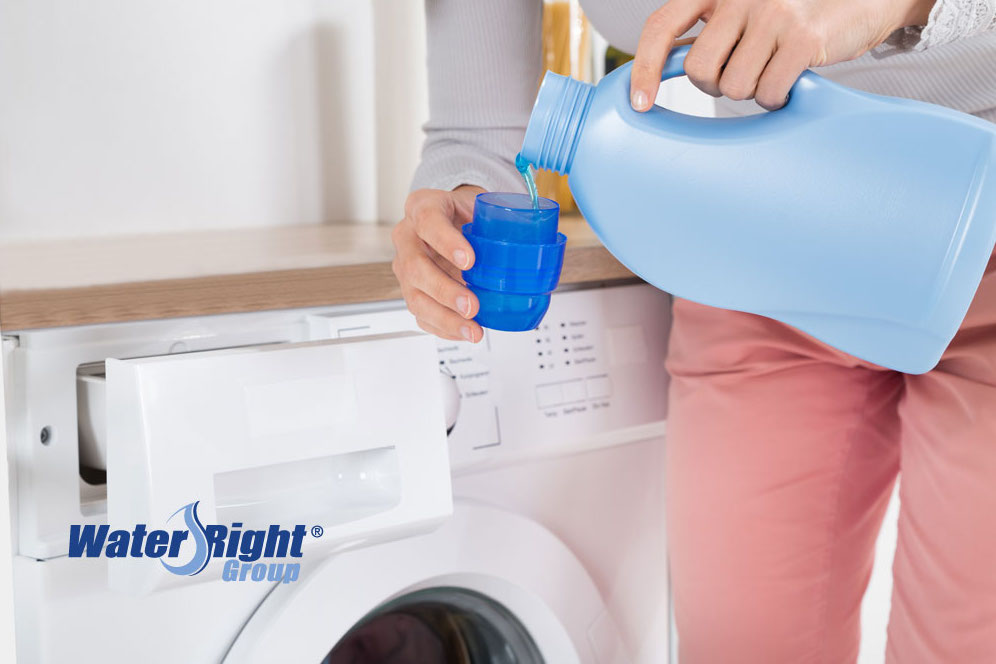
How You Can Get More Detergent for Your Dollar with Soft Water
From cleaner dishes to smoother skin, the benefits of having soft water in your home are endless.
But did you know that soft water can also reduce monthly costs, energy usage, and the amount of detergent needed to thoroughly clean your household items?
Hard water occurs when groundwater collects minerals as it flows through rock and sand, picking up minerals like magnesium and calcium along the way. If you’re like 89.3% of households in the United States, your home probably has hard water. You may not know it, but this could be costing you hundreds of dollars in cleaning products and even more in wasted energy when it comes to heating your home and washing your clothing and dishes.
With the average family spending somewhere around $500 in cleaning products each year, you may be wondering how you can reduce your expenses when it comes to detergents and other household cleaners.
The Water Quality Research Foundation (WQRF) recently organized a study based on a series of experiments carried out by Scientific Services and Battelle to compare how various doses of laundry and dish detergent are affected by the hardness of water, as well as the role that water temperature plays in efficiently cleaning clothes and dishes. Here’s what the study found.
Using Soft Water to Keep Your Clothing Stain-Free
The study used five different laundry detergents to carry out the experiments. Nine stains were tested to identify two specific conclusions: the amount of liquid and powder detergent needed to effectively remove each stain and what the water temperature must be in order to penetrate the stained fabrics. The nine substances included:
- Coffee
- Dust sebum
- Grass
- Blood
- Red wine
- Ground in clay
- Chocolate pudding
- Chocolate ice cream
- Barbecue sauce
When washed with soft water, the stained fabric in the experiment required about 50% of the detergent that was needed for hard water, and was able to effectively remove all nine stains at nearly half the suggested temperature— 60°F compared to the 100°F needed to achieve the same results with hard water.
That means for the average household spending more than $100 on just detergent each year, switching to soft water could save you up to $50 on laundry soap and even more on energy bills.
Of the three determining factors, water softness had the greatest impact on successfully removing the stains, more so than water temperature or detergent dose.
In fact, washing laundry in soft water proved to be 100 times more effective in removing stains than increasing the water temperature or amount of detergent used in the load. The same conclusions were found for both top-loading washing machines and high-efficiency front-loaders. Simply put, the harder the water, the tougher the stains are to remove.
Dishwashers Benefit from Soft Water, Too
It’s not just your washing machine’s performance that improves with the use of soft water, but dishwashers as well.
A separate study was conducted to explore how detergent and water temperatures interact with water hardness levels in automatic dishwashers. Numerous factors were evaluated, including how well difficult foods, such as egg yolk and dried pasta sauce, were removed and what the results were in terms of spotting and leftover film on dishware and silverware.
For the study, four liquid types and two powdered detergents were used to remove residue. Dirty dinner plates, silverware and glasses were loaded into the dishwasher and were evaluated at the end of each cycle.
Two dishwashers were used to conduct each test. Both contained full loads consisting of:
- Common food used to contaminate dishware, including: dry milk, oatmeal, and grease
- Stubborn food, including: dried spinach, pizza sauce, brownie mix, fish, and olive oil
Similar to the results in the laundry detergent study, when washed with water from a water softener, only 30% of the suggested detergent amount was needed to clean the dishware. That means the average bottle of liquid detergent, generally priced between $2 and $5, can last you three times longer when used with a water softening treatment.
Even more impressive was the cleaning power of soft water on its own. Based on the study, using softened water with the recommended detergent dose for both liquid and tablets was up to 12 times more effective at removing food buildup and cloudy residue than using more than the recommended amount of detergent with hard water.
Make The Switch to Softer Water and Start Saving Today!
In addition to costing you more money in cleaning products and energy, hard water can cause buildups in your washing machine and dishwasher and can lead to broken pumps and problems in other appliance parts, forcing you to repair or replace expensive appliances more frequently than you should. Read more on how hard water ruins your appliances here.
To avoid unnecessary costs on dishwasher cleaners, appliance repair, and excessive energy bills invest in a water softening system from Water-Right today and learn how you can save more with using less.

